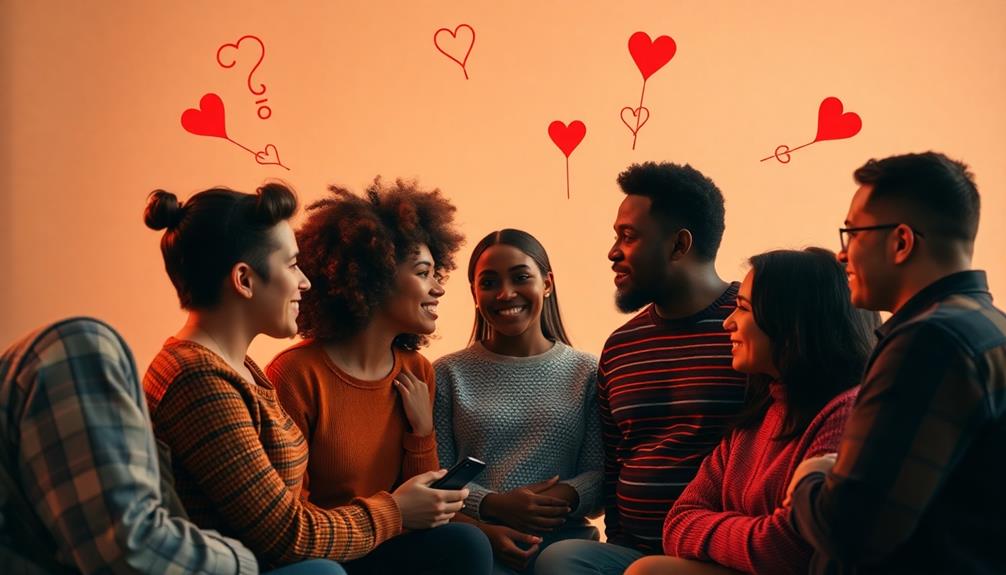Curiosity and empathy are essential for understanding others and enriching your relationships. By asking open-ended questions, you invite diverse perspectives that deepen connections and build trust. This empathic inquiry helps you overcome biases, leading to clearer communication and emotional regulation. Active listening fosters an environment where feelings are acknowledged and understood, allowing for meaningful conversations. Remember, timing matters; focus on empathy before jumping to solutions. Cultivating these skills not only enhances your interactions but also transforms conflict into growth opportunities. If you're enthusiastic to improve your approach, there's more to explore about these powerful concepts.
Key Takeaways
- Curiosity enhances relationships by fostering deeper connections and trust through empathic inquiry and open-ended questioning.
- Overcoming biases, like confirmation and attribution bias, promotes empathy and better understanding in interactions.
- Active listening is essential for empathy, ensuring emotional recognition and creating a safe space for dialogue.
- Timing empathy before problem-solving encourages vulnerability and deeper emotional connections in conversations.
- Empathic inquiry transforms interactions into meaningful exchanges, cultivating healthier and more resilient relationships.
Significance of Curiosity in Relationships

How can curiosity transform your relationships? When you embrace curiosity, you open the door to deeper connections with others. By engaging in empathic inquiry, you learn to explore perspectives beyond your own, fostering trust and collaboration. This is particularly important when maneuvering complex dynamics, such as those present in narcissistic relationships, where understanding varying motivations can be essential.
When you ask open-ended questions and show genuine interest, you enhance your communication skills, allowing you to steer conversations more effectively.
Curiosity also plays an important role in emotional regulation. It helps you manage defensiveness and aggression during conflicts. Instead of reacting impulsively, you can approach disagreements constructively, leading to healthier interactions. This shift in mindset empowers you to understand the motivations and behaviors of those around you.
Cultivating curiosity not only improves your ability to communicate but also strengthens emotional bonds. As you connect on a deeper level, your relationships become more resilient.
You'll find that curiosity nurtures a safe environment where both you and others feel valued and understood. Ultimately, embracing curiosity enriches your relationships, transforming them into spaces of growth and mutual respect.
Overcoming Confirmation Bias

Confirmation bias can cloud your judgment, leading you to see only what aligns with your beliefs while ignoring contrasting evidence.
This mindset can harm your relationships by creating misunderstandings and limiting your empathy.
To overcome this bias, you can adopt strategies that encourage open-mindedness and curiosity about others' perspectives.
Definition of Confirmation Bias
Recognizing the impact of confirmation bias is essential for fostering meaningful connections with others. This cognitive bias leads you to search for, interpret, and remember information that confirms your pre-existing beliefs, often distorting your understanding of reality.
Even though you'd like to learn and grow, confirmation bias can cause you to overlook contradictory evidence, negatively affecting your decision-making and interactions. Embracing practices that promote curiosity, such as navigating relationships in the Vortex, can enhance your ability to connect with others authentically.
For instance, if you focus solely on a patient's lateness while ignoring their punctuality, you skew your perception of their reliability. This can create misunderstandings and hinder your ability to empathize with others.
To overcome confirmation bias, cultivate curiosity that encourages you to challenge your assumptions and seek a broader understanding of various perspectives. Start by recognizing and halting automatic assumptions. Ask open-ended questions to invite diverse viewpoints and maintain a mindset open to being wrong.
Impact on Relationships
Overcoming confirmation bias can greatly enhance the quality of your relationships. When you challenge your existing beliefs, you open the door to more meaningful connections. Instead of clinging to information that reaffirms your views, cultivating curiosity allows you to embrace diverse perspectives, leading to deeper understanding and communication.
Engaging in nighttime meditation can further enhance your ability to connect by promoting relaxation and mental clarity, making conversations more fruitful.
Consider the benefits of adopting a curious mindset in your interactions:
- You'll listen more actively, fostering a safe space for dialogue.
- You'll ask open-ended questions, encouraging others to share their thoughts freely.
- You'll uncover the reasons behind others' actions, reducing misunderstandings.
- You'll become more receptive to feedback, promoting growth and learning.
- You'll decrease defensiveness in discussions, paving the way for constructive conversations.
Strategies for Mitigation
To build on the benefits of a curious mindset, it's crucial to implement strategies that specifically address confirmation bias in your interactions.
Start by actively seeking and considering contradictory evidence. This approach helps you develop a more balanced understanding of situations and the people involved. Instead of only focusing on information that confirms your beliefs, challenge yourself to explore varying perspectives.
Asking open-ended questions like, "What other explanations might there be?" can effectively prompt you to reconsider your assumptions. This technique not only fosters curiosity but also encourages deeper conversations and insights.
Additionally, reflect on your past judgments and be open to the possibility that you might be wrong. This self-awareness reduces defensiveness and creates space for productive dialogues.
Understanding Attribution Bias

Attributing someone's behavior solely to their character can lead you down a path of misunderstanding, often clouding your judgment. This fundamental attribution bias can skew your perception, making you overlook important situational factors that might be influencing their actions.
For instance, when a colleague misses a deadline, you might hastily assume they're lazy, ignoring the external pressures they could be facing.
Consider these implications of attribution bias:
- You misinterpret others' intentions, leading to conflict.
- You miss the chance to understand the full context of a situation.
- You create a negative atmosphere that can affect teamwork.
- You reduce empathy by simplifying complex human behavior.
- You risk damaging relationships through hasty judgments.
Recognizing this bias is essential for effective communication. By being aware of the situational elements at play, you can foster a more empathetic viewpoint.
Instead of jumping to conclusions, ask questions that uncover the reasons behind someone's behavior. This approach not only enhances your understanding but also strengthens interpersonal connections, ultimately reducing conflict and promoting healthier relationships.
Cultivating Curiosity Skills

To cultivate your curiosity skills, start by recognizing your assumptions about people and situations.
Asking open-ended questions like "I wonder why…" can spark deeper conversations and open your mind to new perspectives.
Embracing a learning mindset not only helps you grow but also enhances your connections with others.
Recognizing Assumptions
Assumptions often act as unseen barriers that hinder genuine understanding in our interactions. When you recognize these assumptions, you're taking the first step toward fostering curiosity and empathy. This recognition is vital; it allows you to challenge confirmation bias, which can blind you to important information by only focusing on what confirms your beliefs.
To fully engage in empathic inquiry, consider the following points:
- Challenge your biases: Acknowledge that your perspective mightn't be the only valid one.
- Adopt a learning mindset: Approach conversations with the intent to learn rather than to validate your existing views.
- Recognize behaviors: Understand that actions might stem from various contexts, not just intent.
- Encourage exploration: Create an atmosphere where curiosity thrives, making space for different viewpoints.
- Build trust: By recognizing and questioning your assumptions, you enhance relationships and collaboration.
Open-ended Questions
Open-ended questions serve as powerful tools for cultivating curiosity and fostering deeper connections in conversations. When you ask questions like, "What are your thoughts on…?" you invite expansive responses that encourage others to share their thoughts and feelings. This approach not only deepens your understanding of their perspectives but also uncovers underlying motivations and experiences.
Research shows that asking open-ended questions can reduce defensiveness and promote trust, leading to more meaningful interactions (Gino, 2018). By using these inquiries, you create an environment where individuals feel safe to express themselves, allowing for richer discussions.
Additionally, open-ended questions challenge your own assumptions and expand your awareness of diverse viewpoints. This practice not only enhances your active listening skills but also allows you to engage more deeply with others. As you become more attuned to their responses, you'll likely find that your empathy grows, enriching your relationships.
Incorporating open-ended questioning techniques into your conversations won't only cultivate your curiosity but also foster a greater connection with those around you. Embrace this skill to transform your interactions and deepen your understanding of others.
Learning Mindset
Embracing a learning mindset can transform how you interact with others, fostering curiosity and enhancing your understanding.
By recognizing and halting assumptions about people, you open the door to deeper connections and empathy. When you adopt this mindset, you not only become more inquisitive but also more compassionate in your relationships.
Here are some key strategies to cultivate your curiosity skills:
- Ask open-ended questions: Use prompts like "I wonder why…" to explore diverse perspectives.
- Challenge your judgments: Embrace the possibility that you might be wrong, promoting a more inquisitive approach to interactions.
- Practice active listening: Focus fully on the speaker to truly understand their unique experiences.
- Engage in mindful dialogue: Reflect on discussions to enhance your ability to empathize and connect.
- Reflect regularly: Take time to think about your interactions and identify areas for growth.
Communication Benefits of Curiosity

Curiosity acts like a bridge in conversations, connecting people in meaningful ways. When you approach discussions with genuine curiosity, you encourage open-ended questions that foster healthier interactions. This enhances your understanding while reducing defensiveness, making it easier for both parties to express their thoughts.
By engaging in curious inquiry, you explore others' perspectives more deeply, promoting empathy and emotional connection.
Curiosity also helps combat confirmation bias, allowing you to make more balanced and informed decisions in your relationships. Instead of jumping to conclusions, you're more likely to contemplate different viewpoints, which enriches your conversations.
This mindset not only improves your communication skills but also aids in conflict resolution. When you cultivate curiosity, you lower aggression levels during provocations, leading to more constructive dialogues.
Empathic Inquiry Defined

Empathic inquiry is all about asking questions that connect you with others and foster genuine understanding.
It plays an essential role in building meaningful relationships, as it encourages you to be present and truly listen.
Definition of Empathic Inquiry
Fostering genuine connections often starts with empathic inquiry, a practice that emphasizes asking connective questions to deepen understanding between individuals. This approach goes beyond mere conversation; it actively nurtures empathy and requires consistent effort.
You'll find that empathic inquiry is more effective than articulation skills when building connections. It's built on the foundation of empathy and listening, which are essential for human growth.
Empathic inquiry addresses basic human needs, ensuring individuals feel seen and heard. It promotes personal growth and self-awareness.
When you engage in this practice, you'll notice several benefits:
- Enhances relationships through mutual understanding
- Supports emotional regulation during challenging conversations
- Contributes to resilience in communication
- Encourages open dialogue and exploration of feelings
- Serves as a precursor to effective problem-solving
Importance in Relationships
Building strong relationships hinges on the ability to understand and connect with others. Empathic inquiry plays an essential role in this process. By asking connective questions, you foster empathy, leading to deeper understanding and stronger connections. This practice meets vital human needs: feeling seen and heard, which supports both personal growth and emotional regulation.
Research shows that empathic inquiry is often more effective than simply articulating your thoughts when it comes to building interpersonal relationships. By enhancing your active listening skills and being fully present, you can better recognize and respond to unspoken emotions, greatly improving communication.
When you consistently apply empathic inquiry, you cultivate stronger emotional bonds and greater trust with others. This foundation allows for more effective conflict resolution and collaborative solutions, as both parties feel valued and understood.
In essence, using empathic inquiry transforms ordinary interactions into meaningful exchanges, deepening your connections. It's not just about asking questions; it's about creating a safe space for others to express themselves, ultimately enriching your relationships and enhancing your understanding of those around you.
Active Listening in Empathy

Active listening plays an essential role in developing empathy, as it allows you to truly engage with and understand the emotions and perspectives of others. When you practice active listening, you're not just hearing words; you're exploring deeper into the speaker's feelings and thoughts. This conscious effort creates a safe space for dialogue and vulnerability.
To enhance your active listening skills, consider the following techniques:
- Reflect back what the speaker has said to show understanding.
- Ask clarifying questions to probe deeper into their feelings.
- Minimize distractions to maintain focus on the conversation.
- Set aside personal judgments to foster open dialogue.
- Be present in the moment, demonstrating genuine interest.
Research shows that those who engage in active listening often experience improved relationship satisfaction and lower conflict levels.
By making a consistent effort to listen actively, you not only enhance your understanding of others but also strengthen your connections.
Recognizing Limits of Empathy

Empathy isn't a one-size-fits-all solution; it has its limits. While familiar expressions of empathy can feel comforting, they often miss the mark when it comes to the unique experiences of individuals. You need to recognize and respect these differences in perspectives and feelings to truly connect.
Cultivating deep listening skills is essential; it allows you to grasp each person's sovereign experience and fosters a richer understanding of their reality.
Effective empathic inquiry requires you to approach conversations with openness and curiosity. Slowing down is imperative—take the time to genuinely listen before jumping into problem-solving mode. This conscious act of connection helps you build trust and creates a safe space for others to share their feelings.
Balancing intellectual understanding with empathetic engagement is significant. If you focus too much on analysis, you risk obstructing genuine connections and hindering your ability to hold empathetic space for others.
Timing Empathy in Conversations

Timing plays an essential role in how effectively you engage with others during conversations. When you consciously apply empathy before jumping into problem-solving, you create a deeper understanding of others' feelings and needs.
Slowing down to listen actively is vital; it allows you to prioritize emotional connections over quick intellectual responses. Balancing personal feedback while holding empathetic space also matters; too much analysis can block genuine empathy.
Here are some key points to reflect upon:
- Create Safe Spaces: Effective timing encourages vulnerability, making it easier for others to share their feelings.
- Be Mindful: Acknowledge the individual's unique experiences, enhancing the quality of your interaction.
- Listen Actively: Focus on their words and emotions, fostering a deeper connection.
- Pause Before Responding: Give yourself a moment to process their feelings before you reply.
- Prioritize Emotional Over Intellectual Responses: Shift your focus to empathy first, allowing for open dialogue.
Techniques for Empathic Inquiry

How can you deepen your connections with others through empathic inquiry? Start by asking open-ended questions that invite deeper exploration of feelings and experiences. Techniques like the AEIOU Framework and Empathy Maps can help you visualize these experiences, making it easier to identify emotional needs.
Practicing active listening is essential; being present during conversations allows you to catch unspoken emotions. This attentiveness makes your responses more empathetic and relevant.
One effective method you can use is the "5 Whys." By digging deeper into issues, you uncover underlying perspectives, greatly enhancing your understanding of the person you're engaging with.
Regularly engaging in reflective practices and joining group discussions can also bolster your empathic inquiry skills. These activities encourage you to think critically about your interactions and learn from others.
Ultimately, these techniques not only improve your empathic inquiry but also cultivate healthier and more resilient relationships. By consistently applying these methods, you'll find that your connections become richer and more meaningful.
Embracing empathic inquiry transforms your conversations, allowing you to truly understand and support those around you.
Frequently Asked Questions
What Is the Relationship Between Curiosity and Inquiry?
Curiosity and inquiry are closely linked; when you're curious, you seek answers and explore new ideas. This drive to know more leads you to ask questions, which fuels your inquiry.
As you dive deeper, you uncover different perspectives and gain a broader understanding of subjects. Your curiosity pushes you to challenge assumptions, encouraging you to engage actively with information.
In turn, this enriches your conversations and enhances your learning experiences.
What Is the Connection Between Curiosity and Empathy?
Ever wondered why some conversations feel shallow while others dive deep? Curiosity and empathy are tightly linked; when you're curious about someone's feelings or experiences, you naturally become more empathetic.
As you ask questions and listen actively, you peel back layers of understanding. This process not only helps you connect emotionally but also reduces misunderstandings, making your relationships stronger.
What Is Empathic Inquiry?
Empathic inquiry is a practice where you ask questions to deepen understanding and foster connection with others.
It's about being present and actively listening, allowing you to pick up on unspoken emotions.
By creating a safe space for dialogue, you help others feel seen and heard.
This approach not only promotes personal growth but also enhances emotional regulation, making it easier to solve problems and resolve conflicts effectively in your relationships.
How Do You Foster Connection Empathy and Understanding Between People?
Did you know that 93% of communication is non-verbal?
To foster connection, empathy, and understanding, you need to actively listen and engage with others.
Ask open-ended questions that encourage sharing, and create a safe space where feelings can be expressed without judgment.
By validating emotions and being present in conversations, you'll deepen relationships and build trust.
Conclusion
Just as a gardener nurtures a diverse array of plants, your curiosity can cultivate rich, vibrant relationships. By asking questions and truly listening, you're not just watering the surface; you're digging deep into the soil of understanding. When you embrace empathy, you become a bridge, connecting hearts and minds. So, approach each conversation like a curious explorer, ready to uncover hidden treasures of perspective. In doing so, you'll transform ordinary interactions into extraordinary connections.









